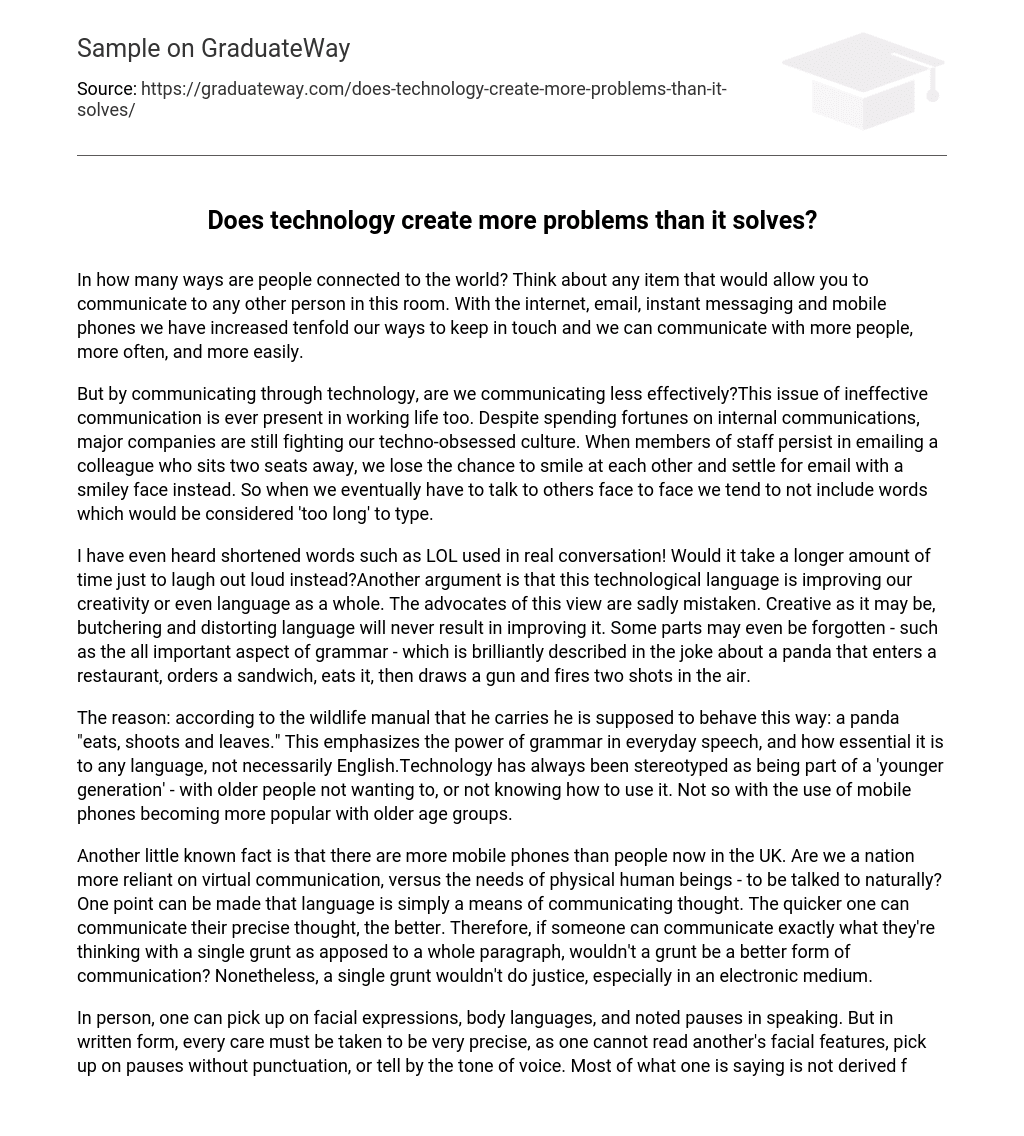Advances in technology have brought about a multitude of ways for individuals to stay connected with the world. This includes different devices that facilitate communication between people in specific locations. The internet, email, instant messaging, and mobile phones have greatly expanded our options for staying in touch. Consequently, it has become easier and more common to maintain connections with a larger number of individuals.
Despite the significant investments made by large companies in internal communications, there continues to be an issue of ineffective communication within the workplace. This problem is partly attributed to our culture’s excessive dependence on technology. Even when employees are physically close to each other, they often choose email communication instead of engaging face-to-face. As a consequence, we lose opportunities for sharing smiles and end up using smiley faces in our emails. Consequently, when we eventually have to interact with others directly, we tend to avoid using words that may seem “too lengthy” to type.
I have also heard abbreviations like LOL being used in actual conversations! Would it require more time to actually laugh out loud instead? Another point is that this technological lingo is enhancing our creativity and language as a whole. However, those who support this idea are sadly mistaken. Despite its creativity, destroying and distorting language will never lead to its improvement. Certain elements may even be overlooked, such as grammar, which is humorously depicted in the joke about a panda entering a restaurant, ordering a sandwich, consuming it, and then pulling out a gun and firing two shots into the air.
The wildlife manual states that a panda is expected to eat, shoot, and leave, highlighting the importance of grammar in everyday communication across all languages. Historically, younger generations have been associated with technology usage while older individuals were thought to be unwilling or unaware of its benefits. However, this notion is incorrect as older age groups are now progressively embracing mobile phones.
There are now more mobile phones in the UK than people, highlighting the potential prioritization of virtual communication over natural human interaction. This raises questions about whether language is solely a means of expressing thoughts and if faster and more precise forms of communication are preferable. Advocates propose that using a single grunt instead of a lengthy paragraph could be an efficient way to convey thoughts. However, relying solely on grunts would not be adequate, especially in electronic mediums.
When communicating in person, it is easier to understand nonverbal cues like facial expressions, body language, and pauses in speech. However, written communication requires precision due to the absence of these visual and auditory cues. The way something is said often carries more meaning than the actual words used, highlighting the importance of mastering written language.
Furthermore, there is a growing concern about the potential ‘Big Brother’ scenario with technology. Our society is under heavy surveillance by CCTV cameras, which capture our actions approximately 300 times every day. The possibility of this information falling into the wrong hands raises alarming questions. With constant advancements in Artificial Intelligence and nanotechnology, these concerns are becoming increasingly common.
Robots, equipped with miniature computer chips containing millions of transistors, can now repair arteries and veins internally due to their small size. The reliance on technology in our global society is growing as we continue to develop it. While we have the option to disconnect from this dependence, it is crucial to consider how long we could endure without computers or mobile phones. Without a doubt, as humans, we are creatures of habit.
Our development of technology aims to improve and change the way we currently live, integrating it as a crucial part of our daily routines. As a result, technology starts exerting a substantial influence on multiple aspects of our lives such as our thinking patterns, professional endeavors, interpersonal dialogues, and written exchanges.
However, it also introduces various other potentials. So, are we advancing technology or is it advancing on its own, and can it sustain this progress? Additionally, technology has significantly enhanced our existence. For instance, imagine returning home to discover your house ablaze without a telephone to dial emergency services. These seemingly trivial aspects are often overlooked, yet their absence would result in severe repercussions.
Technological advancements have made it possible for us to connect with family members around the world through different means, including email for important updates, instant messaging, and web cam chats. However, despite the popularity of using abbreviated language and relying on computer-mediated communication, it is unlikely that this will become the standard way of communicating. Despite great strides in technology, face-to-face conversations remain irreplaceable, particularly because they involve an emotional aspect.
The challenge of accurately expressing emotions like anger or upset in written text is heavily reliant on the tone and cadence of one’s voice. This also applies to replicating sarcasm, making it difficult to convey these elements without spoken language. Nevertheless, I am confident that the benefits of technology will outweigh any disadvantages associated with utilizing such services.
Without cars, computers, or televisions, our world would be significantly altered. Nevertheless, simplifying English excessively could result in a language that is entirely unrecognizable from its present state.





